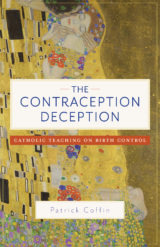By Patrick Coffin
Patrick Coffin is the author of several books, including The Contraception Deception: Catholic Teaching on Birth Control, a comprehensive assessment of the Church’s sexual ethic. He is the host of The Patrick Coffin Show podcast, heard in over 100 countries.

There is no single “official” way of understanding how contraception violates the natural law. Indeed, there are different, sometimes conflicting, theories held by Catholic scholars on this question. Assessing their differences would bring us far afield, but the mere fact of variation in approach is not an argument against the natural law, for all orthodox writers agree on the basic content.
For our purposes, it’s enough to say that contraception violates the natural law because contraception acts against the natural end, or goal, of sexual intercourse, which is the coming to be of new human life. Sexual intercourse is, in Janet Smith’s fine phrase, clearly ordained to “babies and bonding.” We tamper with this fundamental order of things at our peril.
Contraception is inherently anti-life because it treats a real good (the child-to-be) as undesirable enough to motivate a counter-action against the very possibility of its arrival in the womb. A well-functioning biological process is regarded as a threat to the pursuit of subjective pleasure at the expense of objective purpose.
One famous way of glimpsing the natural law in action is to consider the natural end, or purpose, of eating. Obviously, it is nutrition. The mouth, teeth, tongue, esophagus, stomach, and the rest of the digestive system comprise a set of organs and processes that are ordered to, the purpose of maintaining nutritive health.
But food is also tasty (well, except for cauliflower), and it’s pleasurable to enjoy a hearty meal with family and friends. Even if the food tasted awful, to stay alive you’d still eat it, i.e., you’d act in accord with reason in harmony with the natural law.
You can probably guess where this is going. Birth control (particularly the condom and coitus interruptus) corresponds to putting a spoon down one’s throat to induce vomiting. The sensual pleasure of eating would thus be indulged in for its own sake, severed from its primary end, much like the Roman custom of feasting, stepping into the vomitorium to disgorge the food, and returning for more.
If human life is sacred and inviolable, then the means of transmitting human life is in some way sacred and inviolable. In a similar sense in which the eye was made for color, the ear for sound, and the mind for truth, sex was made for something: for the co-creation of a new someone, and the deepened unity of those (hopefully loving) co-creators otherwise known as mom and dad. The whole contraceptive enterprise denies this. Therefore, insofar as it meddles with a natural power that transcends both spouses, it is unnatural.
Dr. Smith has summarized six different natural law arguments against contraception, which she dissects for validity and logical soundness. Her Version D is the most similar to what we have said about the link between God’s sacredness and the reverence we owe to His special involvement, so to speak, in the marital act:
- Major premise: It is wrong to impede the procreative power of actions that are ordained by their nature to assist God in performing His creative act that brings forth a new human life.
- Minor premise: Contraception impedes the procreative power of actions that are ordained by their nature to assist God in performing His creative act that brings forth a new human life.
- Conclusion: Therefore, contraception is wrong.
The key word is “impede.” Contraception is sex—plus the introduction of an impediment. As we’ll see later, abstinence during natural family planning is not an impediment in any sense since there is no sex act to impede.
Among other things, the above argument conveys something of the world’s best-kept secret: the deep veneration the Catholic Church has toward sex. The world has it exactly backwards. The world tends to look upon sex as merely currency for “hook-ups,” as a proof of love, as something for sale—or, more commonly, something by which to sell something else, like cars or beer.
The Catholic Church turns this thinking right side up and proclaims that sexual intercourse—and all the erotic intimacies that cultivate it—deserves the most thoroughgoing protection and respect. “Casual sex” is an oxymoron. When a young man picks out a ring for his intended, he makes sure the ring and its setting matches the beauty of the diamond. He would never Krazy glue the diamond onto a plastic ring. And upon receiving her ring, the young fiancée would never toss it carelessly on a park bench or keep it near the edge of the toilet seat. We naturally, or ought to, treat as awesome things that fill us with awe.
Likewise, it is most fitting that sex be surrounded by the proper setting (the security of marriage), and within marriage, accorded the proper respect (freedom from the intrusion of contraception). Catholicism affirms that sex is not merely acceptable or tolerable (“close your eyes and think of England”) but pure and holy—something that ought never be subject to the blessing-refusal inherent in contraception.
In every Christian wedding, we hear the words from Matthew’s Gospel, “What God has joined let no man put asunder.” But this is exactly what contraception does on the biological and interpersonal level. It puts asunder the two meanings of sex that God has joined, the unitive and the procreative.
You Might Also Like

The Contraception Deception: Catholic Teaching on Birth Control by author Patrick Coffin is a comprehensive assessment of the Church’s sexual ethic. With relevant insight into the development and reception of Paul VI’s landmark 1968 encyclical, Coffin explains why Humanae Vitae is more timely than ever.

